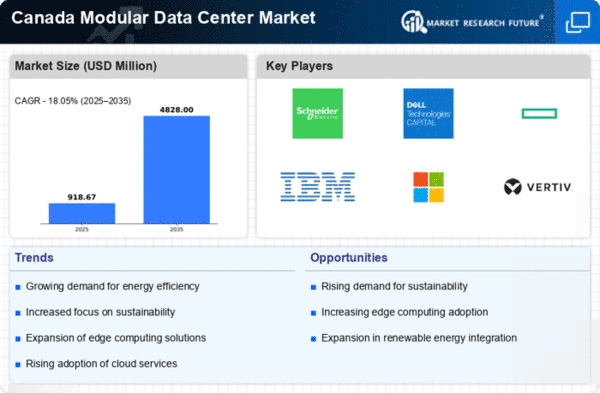Rising Demand for Edge Computing
The increasing reliance on edge computing is a notable driver for the modular data-center market. As businesses in Canada seek to enhance data processing capabilities closer to the source, modular data centers offer a compact and efficient solution. This trend is particularly evident in sectors such as telecommunications and IoT, where low latency is crucial. According to recent data, the edge computing market in Canada is projected to grow at a CAGR of approximately 25% over the next five years. This growth is likely to stimulate demand for modular data centers, which can be deployed rapidly and scaled according to specific needs, thereby reinforcing their role in the modular data-center market.
Advancements in Cooling Technologies
Innovations in cooling technologies are emerging as a significant driver for the modular data-center market. As data centers consume substantial amounts of energy, efficient cooling solutions are essential for reducing operational costs and environmental impact. In Canada, advancements such as liquid cooling and free-air cooling systems are gaining traction. These technologies not only enhance energy efficiency but also align with the growing demand for sustainable practices. The modular data-center market is likely to see increased adoption of these advanced cooling solutions, which can lead to energy savings of up to 30%, thereby appealing to organizations focused on reducing their carbon footprint.
Shift Towards Hybrid IT Environments
The transition towards hybrid IT environments is reshaping the modular data-center market. Canadian businesses are increasingly adopting a combination of on-premises and cloud-based solutions to optimize their IT infrastructure. Modular data centers offer the flexibility needed to support this hybrid approach, allowing organizations to scale resources as required. This shift is reflected in a recent survey indicating that over 60% of Canadian companies plan to invest in hybrid IT solutions within the next two years. As organizations seek to balance performance, cost, and scalability, the modular data-center market is poised to experience substantial growth driven by this evolving IT landscape.
Government Incentives for Green Technology
Government initiatives aimed at promoting green technology are significantly influencing the modular data-center market. In Canada, various federal and provincial programs provide financial incentives for businesses adopting sustainable practices. These incentives may include tax breaks or grants for companies investing in energy-efficient modular data centers. As organizations strive to meet environmental regulations and corporate sustainability goals, the modular data-center market is expected to benefit. Reports indicate that the Canadian government aims to reduce greenhouse gas emissions by 40-45% by 2030, which could further drive the adoption of eco-friendly modular solutions in the data center sector.
Increased Focus on Disaster Recovery Solutions
The growing emphasis on disaster recovery and business continuity planning is a critical driver for the modular data-center market. Canadian enterprises are increasingly recognizing the importance of having robust backup systems in place to mitigate risks associated with data loss. Modular data centers provide a flexible and efficient means of establishing secondary sites for disaster recovery. The market for disaster recovery services in Canada is anticipated to reach $1 billion by 2026, indicating a strong demand for modular solutions that can be quickly deployed in response to emergencies. This trend underscores the vital role of modular data centers in ensuring operational resilience.
















